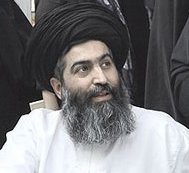Iran Press Watch: The Baha'i Community |
Two Historical Documents by Mousavi and Abtahi
Posted: 15 Jun 2009 04:00 PM PDT
 Editor’s Note: In our continual effort to document the mistreatment of the Baha’is of Iran and the regime’s role in bringing about systematic discrimination against the Baha’is, two official documents by Iranian authorities relating to the Baha’is of that nation are shared below by Iran Press Watch in translation (originals of both documents are posted on the Persian page of this site).
Editor’s Note: In our continual effort to document the mistreatment of the Baha’is of Iran and the regime’s role in bringing about systematic discrimination against the Baha’is, two official documents by Iranian authorities relating to the Baha’is of that nation are shared below by Iran Press Watch in translation (originals of both documents are posted on the Persian page of this site).
The first is a memorandum to government offices and agencies written by Mr. Mir-Hossein Mousavi, who served as the fifth and last Prime Minister of the Islamic Republic of Iran from 1981 to 1989, before the constitutional changes which removed the post of prime minister.
The second document is written by Hojjat ol-Eslam Seyyed Mohammad Ali Abtahi who is an Iranian theologian, scholar and chairman of the Institute for Interreligious Dialogue. He is a former vice president of Iran and a close associate of former President Mohammad Khatami.

In The Name of God
Section seven/Minorities
Number 11-4462
February 1, 1989
Memorandum to all Ministries, Organizations, Government Agencies, Islamic Revolutionary Foundations, and Governors of all Provinces across the country:
Based on the reports received, there have been no coordinated, unified instructions for confronting members of the misguided Baha’i sect available to the executive branch . Therefore, with the approval of the respected President of the Islamic Republic, it is necessary that all ministries, organizations, government agencies, Islamic revolutionary foundations and governors of all provinces across the country to implement the guidelines outlined below as the official policy of the government.
Spies should be sternly confronted based on established laws and regulations, but with respect to other citizens, regardless of their beliefs, they should be treated as ordinary citizens in a manner consistent with the latter part of Article 23 of the Constitution. However, attempts should be made to correct their beliefs.
No official or representative of the Islamic Republic is permitted to deprive citizens of their civil or social rights unless they have been proven to be spies, or as stipulated by laws established by the official legal authorities of the country.
It should be noted that based on Article 13 of the Constitution, Zoroastrian, Jewish and Christian Iranians are the only religious minorities that are free to practice their religious duties within the framework of the laws of the country. They are permitted to conduct their personal lives and activities based on their respective religious laws and ordinances.
Mir Hussein Mousavi
Prime Minister
Second Document
The weighty responsibility of supervising the implementation of the constitution
In The Name of God
Number 80-7662
December 31, 2001
Dearly esteemed brother, Mr. Sayed Mohammad Khatami, President of the Islamic Republic of Iran
With Greetings:
Based on a report presented at the official meeting of the respected Committee of the Islamic Parliament on December 30, 2001, which I attended, with respect to principals 88 and 90 of the Constitution, some of the Baha’is employed in government offices and agencies will lose their rights as citizens of the country due to their belief and their association with the Baha’i religion.
I remind you that on February 1, 1989, the respected former Prime Minister [Mir Hussein Mousavi] with the approval of the President of the Islamic Republic of Iran issued a memorandum to all ministries, organizations, government agencies, Islamic revolutionary foundations, and governors of all provinces across the country indicating:
“No official or representative of the Islamic Republic is permitted to deprive citizens of their civil or social rights unless they have been proven to be spies, or as stipulated by laws established by the official legal authorities of the country.”
By presenting the above-mentioned background information and with respect to Article 23 of Constitution of the Islamic Republic of Iran, your views and recommendations as the President of the country and the authority responsible for the implementation of the Constitution will provide us with guidance regarding the necessity of considering the civil rights of the Baha’i sect workforce.
Signed Seyyed Mohammad Ali Abtahi

 Editor’s Note: Due to recent modifications to the site design, our editorial staff overlooked posting of the following report. Our apologies.
Editor’s Note: Due to recent modifications to the site design, our editorial staff overlooked posting of the following report. Our apologies.